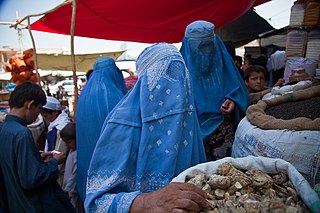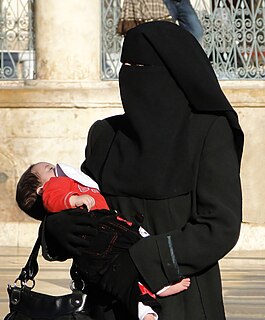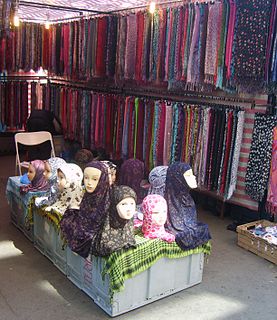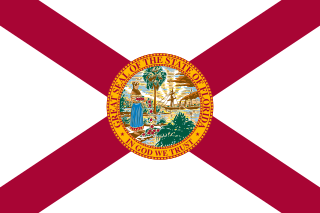
A hijab in common English usage is a veil worn by some Muslim women in the presence of any male outside of their immediate family, which usually covers the head and chest. The term can refer to any head, face, or body covering worn by Muslim women that conforms to Islamic standards of modesty. Hijab can also refer to the seclusion of women from men in the public sphere, or it may denote a metaphysical dimension, for example referring to "the veil which separates man or the world from God."

A veil is an article of clothing or hanging cloth that is intended to cover some part of the head or face, or an object of some significance. Veiling has a long history in European, Asian, and African societies. The practice has been prominent in different forms in Judaism, Christianity, and Islam. The practice of veiling is especially associated with women and sacred objects, though in some cultures it is men rather than women who are expected to wear a veil. Besides its enduring religious significance, veiling continues to play a role in some modern secular contexts, such as wedding customs.

A burqa, also known as chadri or paranja in Central Asia, is an enveloping outer garment worn by women in some Islamic traditions to cover themselves in public, which covers the body and the face. Originating from Arabic: برقع, burquʻ or burqaʻ, and Urdu: بُرقع, it is also transliterated burkha, bourkha, burka, burqua, or burqu' and is pronounced Arabic pronunciation: [ˈbʊrqʊʕ, ˈbʊrqɑʕ].
Islamic clothing refers to clothing worn by Muslims, which varies by region, culture, country, tribe, personal preference, and other demographics. Despite the wide range of styles, Islamic clothing generally follows the rules of hijab for men and women.

A niqab or niqāb is a garment of clothing that covers the face, worn by some Muslim women as a part of a particular interpretation of hijab. According to the majority of Muslim scholars and Islamic schools of thought, face veiling is not a requirement of Islam; however a minority of Muslim scholars, particularly among the Salafi movement, assert that women are required to cover their face in public. Those Muslim women who wear the niqab, do so in places where they may encounter non-mahram (non-related) men.

Headscarves, or head scarves, are scarves covering most or all of the top of a person's, usually women, hair and her head, leaving the face uncovered. A headscarf is formed of a triangular or square cloth folded into a triangle piece of fabric, with which the head is covered.
The intimate parts of the human body must, according to Islam, be covered by clothing. Exposing the intimate parts of the body is unlawful in Islam as the Quran instructs the covering of genitals, and for adult females the breasts. Exposing them is regarded as sin. Precisely which body parts must be covered varies between different schools of Islamic thought. The Quran admonishes Muslim women to dress modestly and cover their breasts and genitals. The Quran explicitly states that "O wives of the Prophet, you are not like anyone among women" and as such has separate rules specifically for the wives of the Prophet.

The British debate over veils began in October 2006 when the MP and government minister Jack Straw wrote in his local newspaper, the Lancashire Evening Telegraph, that, while he did not want to be "prescriptive", he preferred talking to women who did not wear a niqab as he could see their face, and asked women who were wearing such items to remove them when they spoke to him, making clear that they could decline his request and that a female member of staff was in the room.

Islamic dress in Europe, especially the variety of headdresses worn by Muslim women, has become a prominent symbol of the presence of Islam in western Europe. In several countries, the adherence to hijab has led to political controversies and proposals for a legal ban. Some countries already have laws banning the wearing of masks in public, which can be applied to veils that conceal the face. Other countries are debating similar legislation, or have more limited prohibitions. Some of them apply only to face-covering clothing such as the burqa, boushiya, or niqab; some apply to any clothing with an Islamic religious symbolism such as the khimar, a type of headscarf. The issue has different names in different countries, and "the veil" or hijab may be used as general terms for the debate, representing more than just the veil itself, or the concept of modesty embodied in hijab.
A reasonable accommodation is an adjustment made in a system to accommodate or make fair the same system for an individual based on a proven need. That need can vary. Accommodations can be religious, physical, mental or emotional, academic, or employment related and are often mandated by law. Each country has its own system of reasonable accommodations. The United Nations use this term in the Convention on the Rights of Persons with Disabilities, saying refusal to make accommodation results in discrimination. It defines a "reasonable accommodation" as:
... necessary and appropriate modification and adjustments not imposing a disproportionate or undue burden, where needed in a particular case, to ensure to persons with disabilities the enjoyment or exercise on an equal basis with others of all human rights and fundamental freedoms;

The word hijab refers to both the head-covering traditionally worn by some Muslim women and Islamic styles of dress in general.
The French ban on face covering is an act of parliament passed by the Senate of France on 14 September 2010, resulting in the ban on the wearing of face-covering headgear, including masks, helmets, balaclavas, niqābs and other veils covering the face in public places, except under specified circumstances. The ban also applies to the burqa, a full-body covering, if it covers the face. Consequently, full body costumes and Zentais were banned. The bill had previously been passed by the National Assembly of France on 13 July 2010. In April 2011, France became the first European country to impose a ban on full-face veils in public areas.

In a predominantly Muslim society, as many as 90% of women in Egypt have adopted a form of veiling. A majority of Egyptian women cover at least their hair with the hijab. A hijab refers to a head covering that is worn by Muslim women. Although the phenomenon of wearing the niqāb, a veil which covers the face is not as common, the niqab in Egypt has become more prevalent. While a few women in Egypt wear a black niqab along with a billowing black abaya as seen in countries such as Saudi Arabia, many choose to wear different colors of the niqab or manipulate the hijab to cover their face. Regardless, the growing trend of munaqqabat, or women who wear the niqab, has alarmed the authorities. They have begun to see this dress as a security threat, because it hides the face, and because it is perceived as a political statement, a rejection of the state in favor of a strict Islamic system.
Azmi v Kirklees Metropolitan Borough Council [2007] IRLR 434 is a UK labour law case, concerning indirect discrimination on grounds of religion. The United Kingdom Employment Appeals Tribunal in London (EAT) dismissed the appeal in respect of discrimination and/or harassment, but awarded £1,100 to the plaintiff "for injury to her feelings" as a result of the LEA's having failed to follow the statutory grievance protocol.
Kendra Drider is a French Muslim woman of Moroccan descent. She made the headlines when she announced she would stand in the French presidential election, 2012 in protest at the burqa ban.

The Haredi burqa sect, is a religious group within Haredi Judaism, primarily concentrated in Israel, which claims that modesty requires a burqa-style covering of a woman's entire body, a shal, including a veil covering the face. The garment, which looks more like a niqab than a burqa, is also called frumka, a play of the word frum and "burqa". The group, which was estimated to number several hundred in 2011, is concentrated in the town of Beit Shemesh.
The mugshot publishing industry is a niche market of tabloid journalism in the United States. The industry consists of companies that publish mugshots and booking details of individuals arrested by law enforcement agencies. These companies publish the arrest information in tabloids, through local and multi-jurisdictional search websites. The related reputation management industry profits when individuals pay a fee to have their mugshot removed from one or more websites; often the same entity owns both the publishing site and the removal service, which has led to allegations of and lawsuits for extortionate practices and arrests of mugshot business owners on charges identity theft, money laundering, and extortion. In 2018 the journal of the American Bar Association called the industry an "online extortion scheme."
Zunera Ishaq is a Canadian Sunni Muslim woman living in Mississauga, Ontario, Canada, who was at the centre of a debate about the right to wear a niqāb— a veil that covers most of the face—when taking the Oath of Citizenship at a public citizenship ceremony administered under the Citizenship Act, RSC 1985, c C-29, which became a point of controversy during the 2015 Canadian federal elections.
In Australia, there is an ongoing debate over the possibility of a ban on the wearing of burqa, a conservative form of dress for Islamic women. There are currently 14 nations that have banned the burqa, including Austria, France, Belgium, Denmark, Germany, Netherlands, Latvia, Bulgaria, Cameroon, Chad, Congo, Gabon, China and Morocco.
Henda Ayari is a French writer, feminist and secular activist.
















